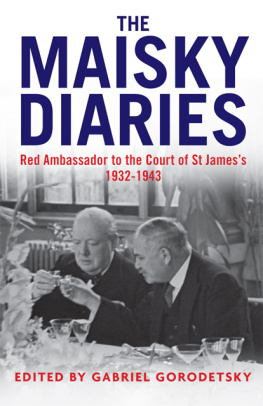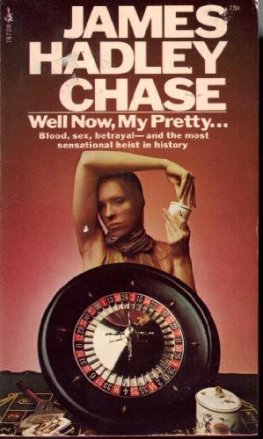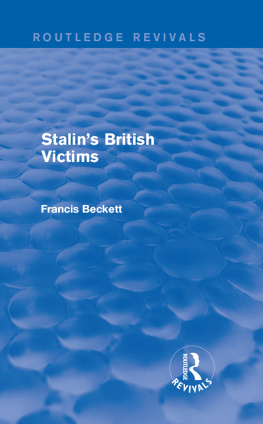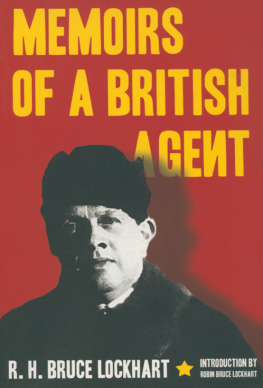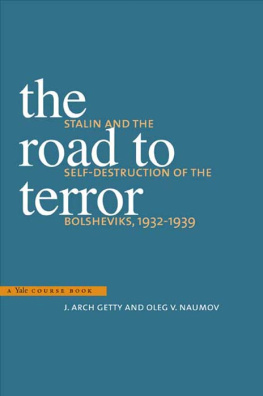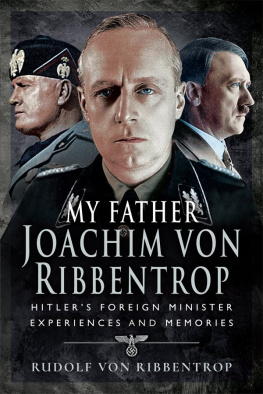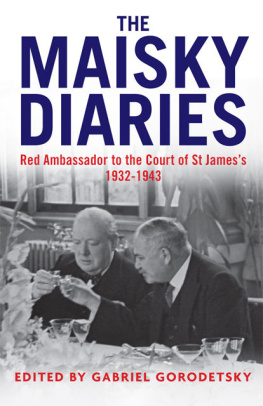

Copyright 2015 Gabriel Gorodetsky
All rights reserved. This book may not be reproduced in whole or in part, in any form (beyond that copying permitted by Sections 107 and 108 of the U.S. Copyright Law and except by reviewers for the public press) without written permission from the publishers.
For information about this and other Yale University Press publications, please contact:
U.S. Office:
Europe Office:
Typeset in Minion Pro by IDSUK (DataConnection) Ltd
Printed in Great Britain by TJ International Ltd, Padstow, Cornwall
Library of Congress Cataloging-in-Publication Data
Maiskii, I. M. (Ivan Mikhailovich), 18841975.
The Maisky diaries : red ambassador to the Court of St Jamess, 19321943 / edited by Gabriel Gorodetsky.
pages cm
Includes bibliographical references and index.
ISBN 978-0-300-18067-1 (alk. paper)
1. Maiskii, I. M. (Ivan Mikhailovich), 18841975. 2. World War, 19391945Diplomatic history. 3. Soviet UnionForeign relations19171945. 4. AmbassadorsGreat BritainDiaries. 5. AmbassadorsSoviet UnionDiaries. 6. Soviet UnionForeign relationsGreat BritainSources. 7. Great BritainForeign relationsSoviet UnionSources. I. Gorodetsky, Gabriel, 1945- editor. II. Title. III. Title: Red ambassador to the Court of St Jamess, 19321943.
D754.R9M28 2015
327.47041092dc23
2015016351
A catalogue record for this book is available from the British Library.
10 9 8 7 6 5 4 3 2 1
Contents
Acknowledgements
This diary is published with the permission of the Scheffer-Voskressenski family Ivan Maiskys heirs. I am most grateful for their cooperation and assistance in the preparation of this volume. I should also like to thank the Russian Foreign Ministry, the custodians of the Maisky diaries, for allowing me access to the original diaries, and for their help with archival sources and photographs. Particular gratitude is due to Professor Itamar Rabinovich, former president of Tel Aviv University, for his assistance in raising a generous grant towards the costs of the translation of the diary into English.
Few publishers today would enthusiastically embrace a project which involves the publication of three large volumes of a heavily annotated diary. I am grateful to John Donatich, the director of Yale University Press, and his team for their continuing unstinting support. I owe a special debt to Robert Baldock, the managing director of the London office of Yale University Press (who had commissioned my earlier book, Grand Delusion: Stalin and the German Invasion of Russia), for his abiding faith in me. No one could wish for a more perceptive, knowledgeable and supportive editor. It was he who convinced me, in addition to the complete three-volume edition, to produce a single compendium of excerpts from Maiskys diaries, which would be accessible to a wider audience. The result, a lavish book, beautifully produced, is a testament to his unrivalled skills.
This book is the fruit of more than ten years of extensive research. I was most fortunate to profit from a series of generous fellowships at the Institute for Advanced Study at Princeton, the Institute for Advanced Studies at Freiburg, and the Rockefeller Foundations Bellagio Center. They provided most conducive conditions for pursuing my work, and a fertile ground for testing and sharing my ideas with leading fellow historians. The lions share of my work, however, was done under the auspices of All Souls College, Oxford. It was Isaiah Berlin, a legendary fellow of the college, who first introduced me to Oxford in 1969 and encouraged me to write my dissertation there; the circle was miraculously closed for me when I was first offered a visiting fellowship at All Souls in 2006 and subsequently elected as a fellow. I can hardly find the proper words to describe the friendships I have forged at All Souls, and the challenging yet congenial environment I have encountered at the college undoubtedly a guardian of scholarship in its purest form. Sir John Vickers, the warden of the college, and John Davis, the former warden, made me feel at home and spared no effort in providing me with the utmost assistance and encouragement.
I was extremely fortunate to have Tatiana Sorokina and Oliver Ready as translators of the diary. Their combined efforts have produced a meticulous and elegant translation that is convincingly idiomatic yet faithful to Maiskys unique literary prose. I was equally fortunate in having Clive Liddiard as my copy-editor. His succinct yet wise and punctilious interventions improved the text considerably, as did his mastery of the Russian language and familiarity with Slavic and East European cultures.
Special appreciation is due to Hillel Adler, who initially helped me set up a most sophisticated database which allowed us to tame and master a voluminous body of archival sources. Dr Ruth Brown was equally helpful in organizing the glossary of the more than a thousand people mentioned in the diary. Dr James Womack produced some exquisite translations from the Russian of various letters in Maiskys private archives.
Finally, Ruth Herz, my wife, friend and companion, would be the first to admit that, rather than a burden in our life, the years spent with Maisky represented a fascinating joint journey.

1. Portrait of Maisky.
Introduction
The unique and fascinating diary of Ivan Mikhailovich Maisky, Soviet ambassador to London from 1932 to 1943, is one of the few kept by a Soviet dignitary in the 1930s and during the Second World War. Pardoned in 1955, Maisky led a protracted yet ultimately futile campaign to retrieve them. His pleas were turned down by the Ministry for Foreign Affairs on the grounds that the diary contained various official material. He was given only one year of limited access to it while he wrote his memoirs, but was denied access to any other archival sources. The diary remained inaccessible to researchers for decades.
Serendipity often lies at the heart of scholarly discoveries. In 1993, under the aegis of both the Israeli and the Soviet foreign ministries, I launched a research project which culminated in the joint official publication of documents on Israeli-Soviet relations. It is hard to describe my excitement when, while seeking information on Maiskys involvement in the Soviet decision to support the partition plan for Palestine in 1947,Maisky typed his daily impressions in the evening, though there are also handwritten entries (remarkably missing from the Russian edition) which were often written away from the scrutinizing oeil de Moscou within his office at the embassy.
Recognizing the distinctive value of the diary, Yale University Press generously agreed to publish it in its entirety, with my extensive commentary, in three volumes. I was, however, encouraged to produce this abridged version, to make it accessible to a wider audience. Making the selections for the compendium volume (25 per cent of the original diary and of my commentary) was particularly painful, as the text left out proved to be just as fascinating and compelling as that which was included. My guidelines were to retain the character and flow of the narrative. This volume is therefore stripped of the vast referential apparatus which will shortly be available to the interested reader in the full three-volume version. Abridgements are indicated by an initial space followed by ellipsis and a subsequent space. Wherever Maisky himself uses ellipsis, there is no initial space. When Maisky employs a word (or phrase) in English, that word appears in
Next page
